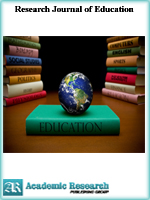Research Journal of Education
Online ISSN: 2413-0540
Print ISSN: 2413-8886
Print ISSN: 2413-8886
Quarterly Published (4 Issues Per Year)

Archives
Volume 4 Number 8 August 2018
Students’ Attitudes and Motivation Towards Learning Literature in English in Zanzibar Secondary Schools
Authors: Mary A. Mosha
Pages: 133-144
Abstract
This paper investigated students’ attitudes and motivation towards learning literature in English in three government secondary schools in Zanzibar (one in urban and two in rural areas). The study had a sample of 96 people; 45 boys, 45 girls, and 6 teachers who were teaching literature in English at the selected schools. They were selected through purposive sampling technique. Mixed method was used. Data were collected through interview, observation, and questionnaires. Predictable variables were number of teachers teaching the subject and their qualifications, learning environment, teaching and learning materials, and students’ attitudes and motivation towards learning the subject. Findings revealed that there was shortage of teachers teaching the subject, and some of them were not trained. Students had positive attitudes and motivation towards learning the subject because it was a source of information not only from their own society but also from the world at large. Additionally, literature in English was found a means of entertainment as well as educating the students. However, students’ positive attitudes and motivation towards learning the subject were hindered by unfavourable conditions such as shortage of literature books, difficult English vocabularies, large class sizes, limited time to read suggested literature books, poor teaching methods, and teachers themselves. As a result the study suggests the provision of appropriate and adequate reading materials to all secondary schools, expose teachers to more training so as to be more knowledgeable about various suitable methods of teaching the subject, and improve classroom learning environment.
Structural Equation Modeling of Cognitive Determinants of Technology Integration Literacy in Ghanaian Higher Education
Authors: Gideon Mensah Anapey ; Dominic Kwaku Danso Mensah ; Stephen Antwi-Danso
Pages: 121-132
Abstract
Technological innovations are altering the lives of the poor, rich, nation’s economics, and education globally. Hence, Ghana’s commitment to formulate the ICT for Accelerated Development (ICT4AD) Policy in 2003 to achieve the transformative vision of competing favorably in the knowledge economy in addition to the introduction of ICT-related subjects in the Ghanaian schools to develop the human resources for indigenous knowledge development is laudable. However, instructional technologists feared that the Ghanaian ICT curriculum from basic to tertiary level might be too generic and lacking curriculum-specific integration literacy, thereby likely to widen the digital divide. To support Ghana’s vision for ICT integration into higher education lessons, the current study sought to predict university graduates’ integration literacy from cognitive constructs using partial least squares structural equation modeling (PLS-SEM) approach. The measurements and structural model fit indices were tested with SmartPLS Version 3. The results showed that students’’ goal-setting and need for achievement significantly predicted over 15% (R2 = .155) of ICT integrate skills. However, self-efficacy was not an important predictor (t = 1.74, p > .05) for students ICT integration literacy in the Ghanaian setting. We concluded that whilst graduates’ goal-setting and need for achievement traits motivate them to acquire technology skills in the Ghanaian public universities, certainly, 85% of latent variables such as pedagogy, lecturers’ computer integration competencies, and access remain unaccounted for per our structural model. The study recommends that career counsellors could design cognitive interventions to improve students’ self-efficacy traits and educational administrators should encourage formative assessment by ICT instructors in their schools to enhance skills developments.
Oral Communication Apprehension Among ESP Students, the Case Study of Third-Year Political Sciences’ Students at Chlef University-Algeria
Authors: Naimi Amara
Pages: 113-120
Abstract
The main purpose of this article is to examine the level of Communication Apprehension (CA) among Third-Year Political Science students studying English for Specific Purposes (ESP) at Chlef University, and then investigate the main factors that lead to their CA in the ESP classroom. The instruments that were used for data collection in the study are a questionnaire administered to 50 students and an interview conducted with 4 teachers. The findings of the study revealed that most students had high level of CA with the relative contribution of two main reasons: instructional and psychological factors to the situation. Finally, some suggestions and recommendations on how to reduce communication apprehension among ESP students and improve their speaking skills were stated.
Individualized English Assignment in Primary School
Authors: Jinxiu Jing
Pages: 110-112
Abstract
English assignment could embody several functions: consolidating language learned in class, extending students’ horizon and developing students’ key competence which is required in a new era of information evolution. This paper aims at raising principles as well as approaches to realize individualized English assignment in Primary school in the hope of endowing students’ chances to develop as an all-round developed individual.



